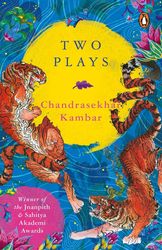Chandrasekhar Kambar, one of the leading figures in contemporary Indian literature, is known for his works rooted in the rural lore of north Karnataka. The very fact that his works carry a rich folk idiom from his land makes their translation a tough job. Krishna Manavalli, however, has triumphed in providing a faithful translation to his mesmerising works, The Bringer of Rain: Rishyasringa and Mahmoud Gawan, in the book Two Plays.
The Bringer of Rain: Rishyashringa is a spin-off of Kambar’s long poem Heleatini Kela (Listen, I Will Tell You). Both the poem and the play are set in a fictional village, Shivapura.
The play starts with the famine-struck Shivapura waiting for village chieftain's son Balagonda; there is a prophecy that his homecoming would bring rain. But it becomes evident that his mere presence will not bring rain. The correction needs to be done to get rid of the “bundle of old karma”, and Balagonda has to confront his father for that.
As a play, Mahmoud Gawan is very different from Rishyashringa. The “rural” Kannada in Rishyashringa makes way for a “neutral” Kannada in Mahmoud Gawan. As musician Rajeev Taranath notes in the foreword of Two Plays, Manavalli “was able to create a language which can handle these two extremes of the source language”.
Mahmoud Gawan is a historical play that portrays the life of an Iranian merchant who comes to India and later becomes diwan of the Bahmani Sultanate. As diwan, he treats people with compassion and promotes equality and religious harmony, but the treacherous political atmosphere in the sultanate causes his tragic death. Kambar's plays are layered at multiple levels, and Manavalli has produced the best translation—and thereby an apt tribute—to Kambar’s works.
Two Plays
By Chandrasekhar Kambar
Translated by Krishna Manavalli
Published by Penguin Books
Price Rs299; pages 212



